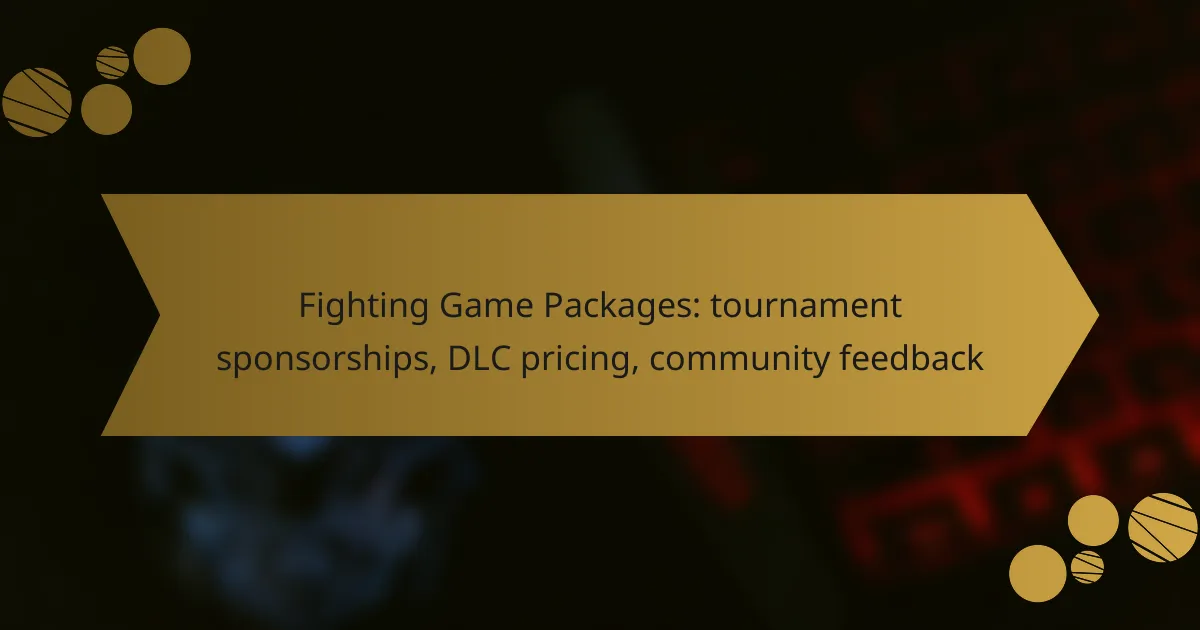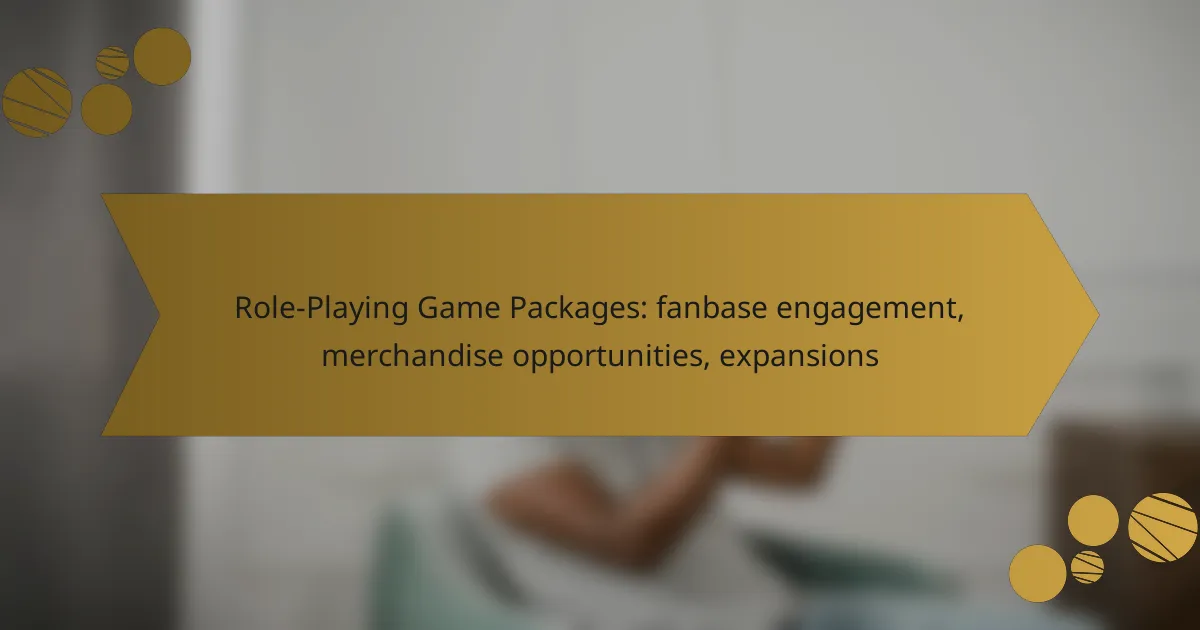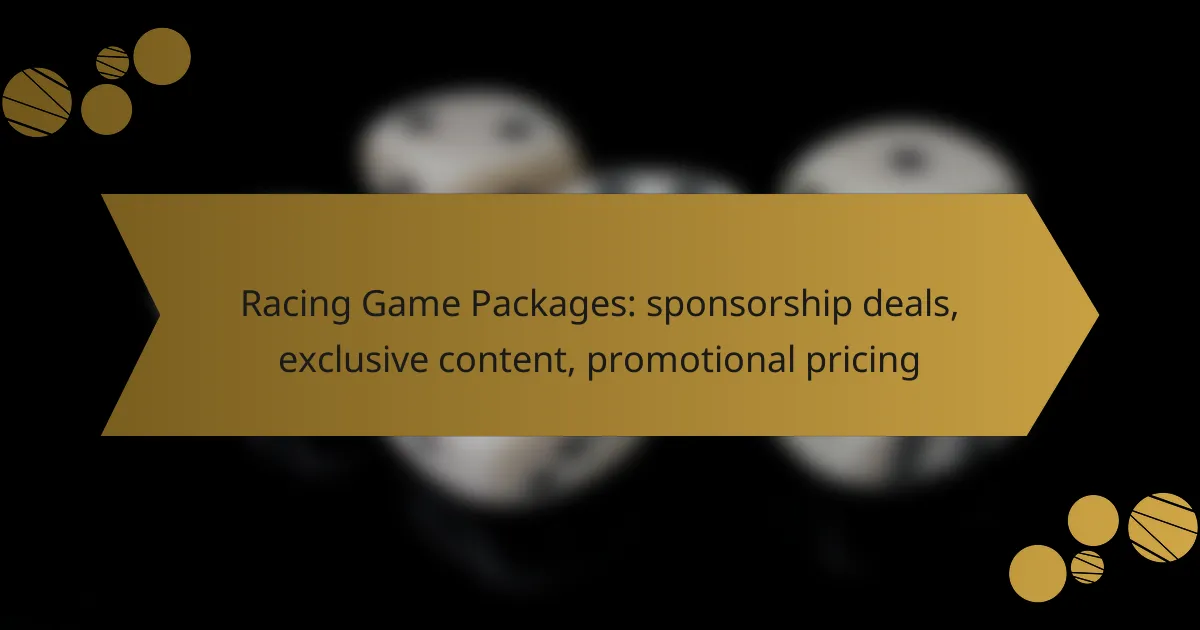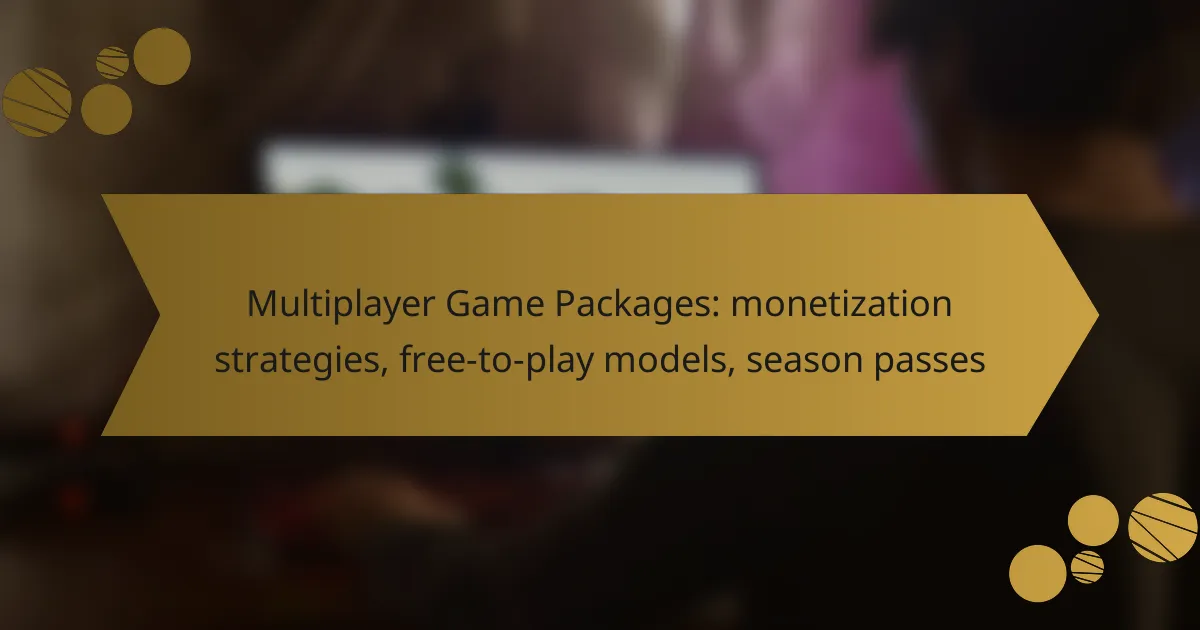In the dynamic world of fighting games, tournament sponsorships play a vital role in elevating events by boosting financial support and visibility, ultimately enriching the gaming community. Additionally, the diverse pricing models for downloadable content (DLC) allow players to customize their experience while expanding character rosters. Community feedback is essential in this ecosystem, guiding developers in refining gameplay and ensuring that player preferences are met.
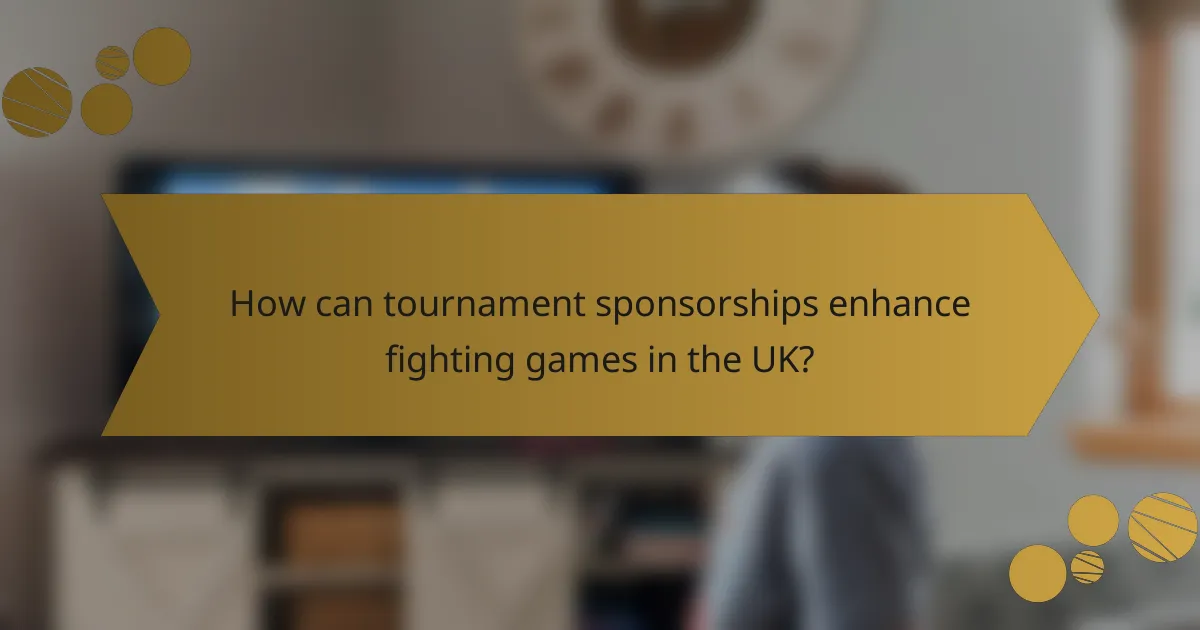
How can tournament sponsorships enhance fighting games in the UK?
Tournament sponsorships can significantly enhance fighting games in the UK by increasing financial support and visibility for events. This not only boosts the prize pools but also fosters a stronger connection between brands and the gaming community.
Increased prize pools
Higher sponsorship funding directly contributes to increased prize pools for tournaments. This financial support can elevate the stakes, attracting more skilled players and larger audiences. For example, sponsorships can raise prize pools from a few hundred pounds to several thousand, making competitions more appealing.
When organizing tournaments, consider tiered sponsorship levels to encourage more businesses to contribute. Offering different packages can help secure funding from local shops to larger gaming companies, enhancing the overall experience for participants and spectators alike.
Brand visibility for sponsors
Sponsoring tournaments provides brands with valuable visibility among a targeted audience of gaming enthusiasts. Companies can showcase their products through banners, merchandise, and promotional materials during events, reaching potential customers directly. This exposure can lead to increased brand loyalty and sales.
To maximize brand visibility, sponsors should engage with the community before, during, and after events. Utilizing social media platforms and streaming services can amplify their reach, ensuring that their involvement is recognized by a broader audience.
Community engagement opportunities
Tournament sponsorships create opportunities for brands to engage with the gaming community in meaningful ways. By hosting events, workshops, or meet-and-greets, sponsors can build relationships with players and fans, fostering a sense of community. This engagement can lead to long-term loyalty and support.
Brands should consider interactive elements, such as giveaways or contests, to enhance community involvement. These activities not only promote the sponsor but also enrich the tournament experience, making it memorable for participants and spectators alike.
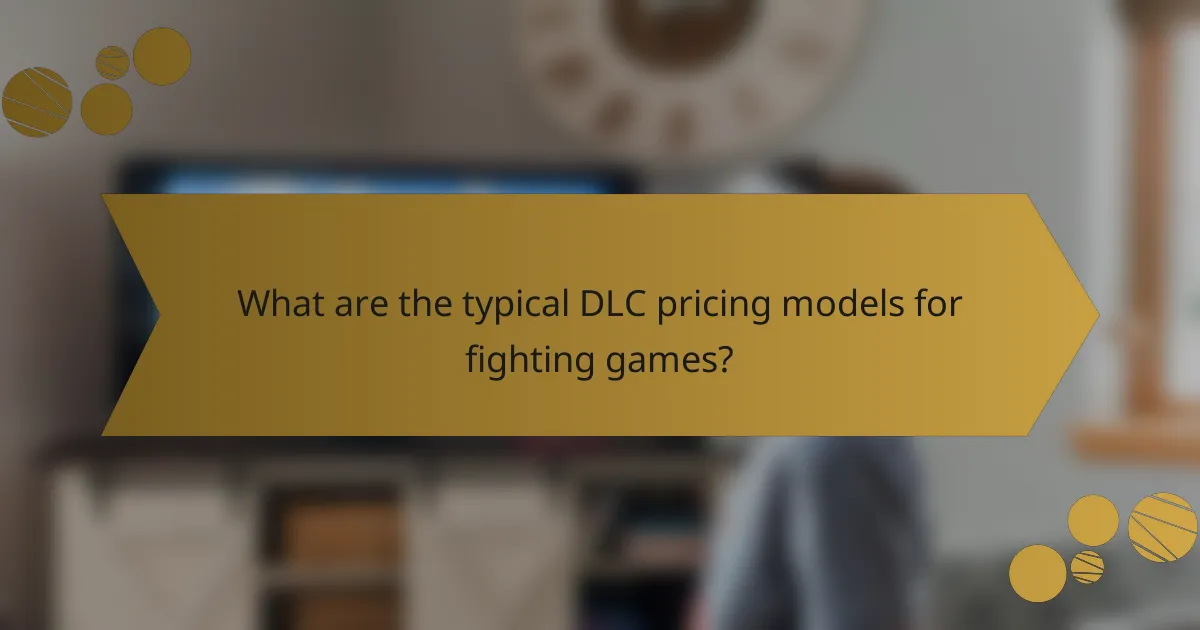
What are the typical DLC pricing models for fighting games?
Fighting games often utilize various downloadable content (DLC) pricing models to enhance gameplay and expand character rosters. Common models include season passes, individual character purchases, and regional pricing adjustments, each offering different value propositions to players.
Season pass pricing structures
Season passes typically bundle multiple DLCs at a discounted rate compared to purchasing each individually. Prices can range from around $20 to $50, depending on the number of characters and additional content included. This model encourages players to commit to a game long-term, providing access to new content as it releases.
When considering a season pass, evaluate the planned content and release schedule. If the game has a strong track record of regular updates, a season pass can be a cost-effective choice.
Individual character pricing
Individual character DLCs allow players to purchase specific fighters, usually priced between $5 and $10 each. This model offers flexibility for players who may only want a few new characters rather than a full season pass. However, buying characters separately can add up quickly if multiple fighters are desired.
It’s essential to check if individual characters come with unique abilities or gameplay mechanics that justify their cost. Some games may also offer free characters periodically, so keep an eye on community announcements.
Regional pricing variations
Regional pricing variations reflect local economic conditions, with DLC prices adjusted to be more affordable in different markets. For instance, a season pass priced at $30 in the U.S. might be around 50 BGN in Bulgaria or 25 EUR in Germany. This strategy aims to make games accessible to a broader audience.
Players should be aware of these variations when purchasing DLC. Sometimes, regional sales or discounts can further reduce costs, making it worthwhile to monitor local pricing trends and promotional events.
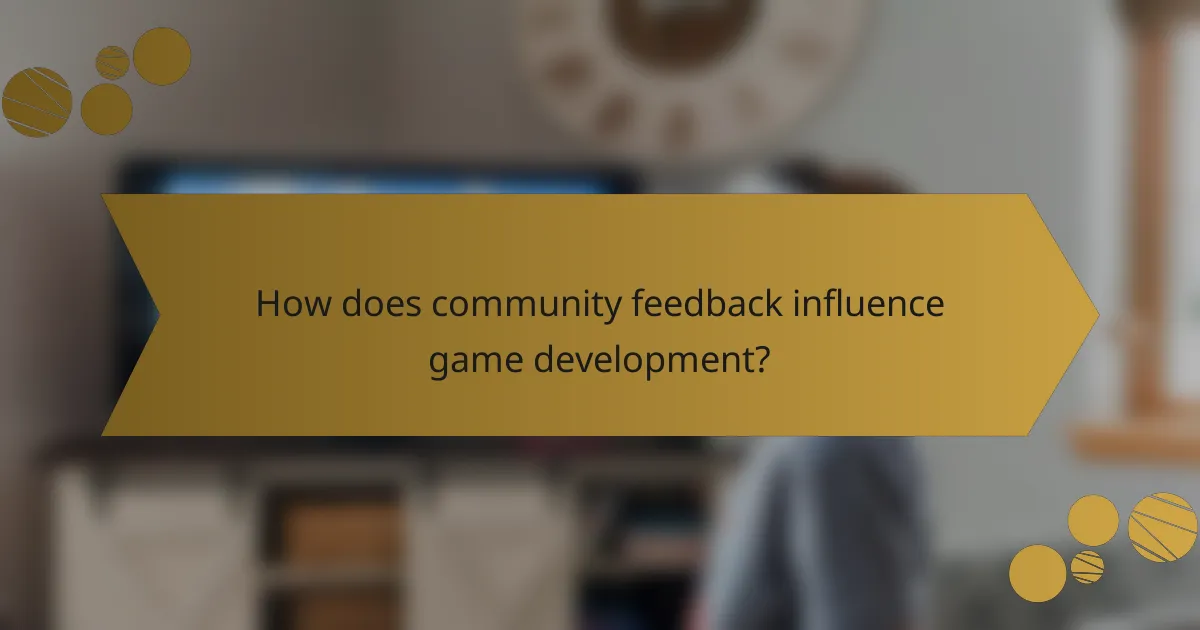
How does community feedback influence game development?
Community feedback plays a crucial role in shaping game development by providing developers with insights into player preferences and experiences. This feedback helps in refining gameplay, enhancing content, and fostering a more engaged player base.
Balancing gameplay mechanics
Balancing gameplay mechanics involves adjusting character abilities, damage output, and game rules based on player experiences and suggestions. Developers often analyze community feedback to identify overpowered or underpowered elements, ensuring a fair competitive environment. For example, if a character is frequently reported as too strong, developers may reduce their damage or increase cooldowns to restore balance.
Regular updates based on player feedback can lead to a more enjoyable experience, but developers must be cautious not to make changes too frequently, as this can frustrate players who are adapting to new mechanics.
Content updates based on player input
Content updates driven by player input can include new characters, stages, and game modes that align with community desires. Developers often conduct surveys or monitor forums to gauge interest in potential additions. For instance, if players express a strong desire for a specific character from a popular franchise, developers may prioritize that character’s inclusion in future downloadable content (DLC).
Implementing community-suggested content can enhance player satisfaction and retention, but it’s essential for developers to maintain their creative vision while incorporating feedback.
Community-driven events and tournaments
Community-driven events and tournaments foster engagement and competition among players, often organized by fans or local gaming communities. These events can range from small online competitions to large-scale tournaments with sponsorships and prizes. Developers may support these initiatives by providing in-game rewards or promotional materials, which can enhance the overall experience for participants.
Encouraging community events not only strengthens player connections but also helps developers gather valuable insights into competitive gameplay and player preferences, which can inform future updates and game design decisions.
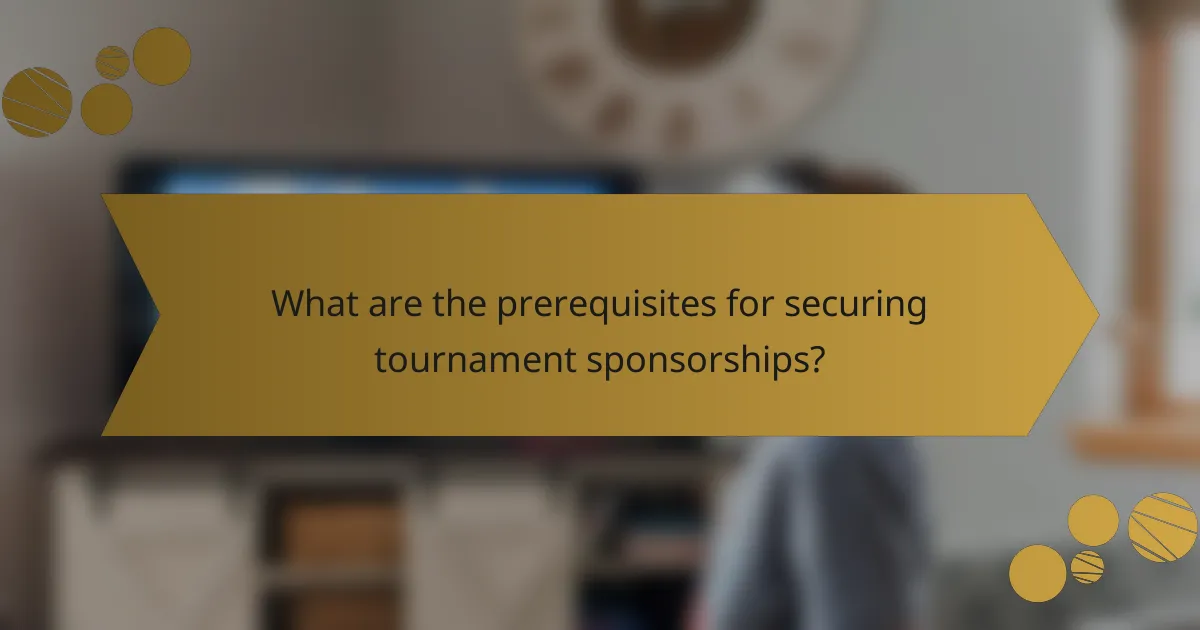
What are the prerequisites for securing tournament sponsorships?
Securing tournament sponsorships requires a solid understanding of your audience, effective event promotion, and alignment with potential sponsors’ brand values. Meeting these prerequisites can significantly enhance your chances of attracting financial support for your gaming events.
Audience reach and engagement metrics
To attract sponsors, you need to demonstrate a strong audience reach and engagement. This includes metrics such as the number of participants, viewers on streaming platforms, and social media interactions. Sponsors typically look for events that can reach thousands of viewers, so showcasing your audience demographics can be beneficial.
Consider using analytics tools to track viewer engagement and provide potential sponsors with data on peak viewing times and audience retention rates. Highlighting these metrics can help you present a compelling case for sponsorship.
Brand alignment with sponsors
Successful sponsorships often hinge on the alignment between the event’s brand and the sponsor’s values. Research potential sponsors to ensure their target audience and brand image resonate with your tournament’s community. For instance, a family-friendly game might seek sponsors that promote similar values.
When approaching sponsors, tailor your pitch to emphasize how your event can enhance their brand visibility and connect with their target market. This alignment can lead to more meaningful partnerships and long-term sponsorship agreements.
Event organization and promotion strategies
Effective event organization and promotion are crucial for attracting sponsorships. Create a detailed plan that outlines the event’s structure, timeline, and promotional strategies. Use a mix of online marketing, social media campaigns, and community engagement to build excitement around the tournament.
Additionally, consider collaborating with influencers or popular streamers to amplify your event’s reach. A well-promoted event with clear organization can demonstrate to potential sponsors that you are capable of delivering a successful tournament.
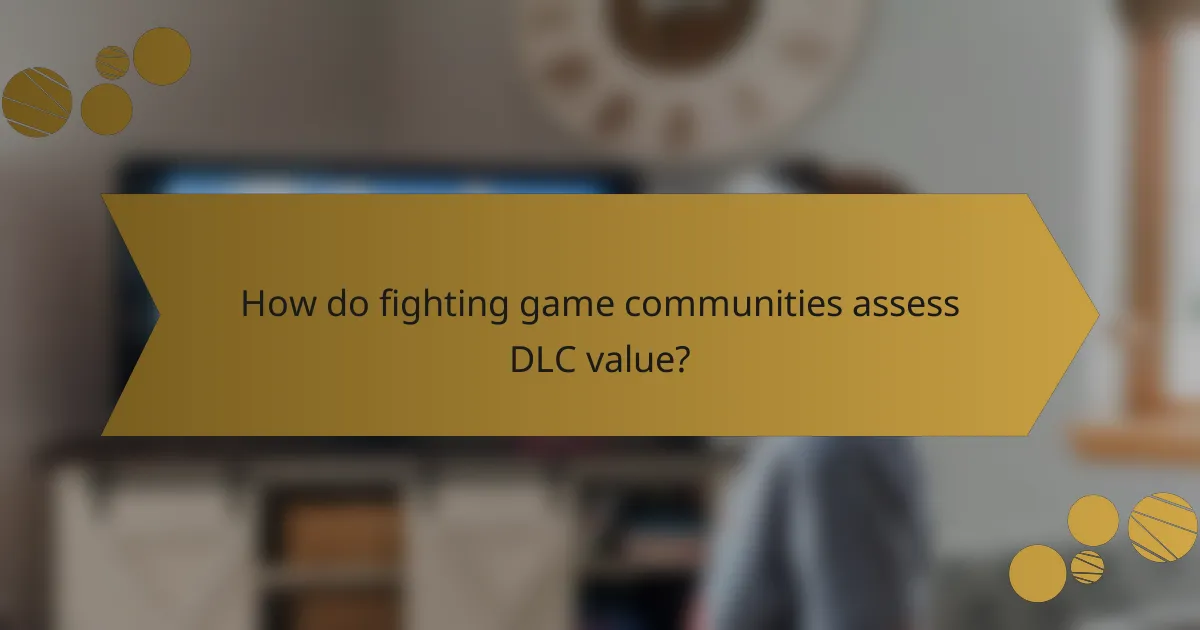
How do fighting game communities assess DLC value?
Fighting game communities evaluate DLC value primarily based on content quality, character balance, and community feedback. Players consider whether the new content enhances gameplay and maintains competitive integrity, alongside how it compares to offerings from other games.
Content quality and character balance
Content quality refers to the depth and creativity of new characters, stages, and modes introduced in DLC. Players expect well-designed characters that fit seamlessly into the existing roster, maintaining balance to ensure fair competition.
Character balance is crucial; if a new character is significantly stronger or weaker than existing ones, it can disrupt the game’s competitive scene. Developers often release patches to adjust balance, but initial impressions can heavily influence community perception of DLC value.
Comparison with competitor DLC
Players frequently compare DLC offerings across different fighting games to assess value. They look at the amount of content provided, pricing, and how well the new features integrate into the overall game experience.
For example, if a competing title offers a larger roster of characters or more extensive gameplay modes for a similar price, players may view the original game’s DLC as less valuable. Keeping track of competitor releases can help players make informed decisions.
Player reviews and feedback
Community feedback plays a significant role in assessing DLC value, as players share their experiences and opinions on forums and social media. Positive reviews often highlight enjoyable gameplay and balanced characters, while negative feedback can stem from perceived shortcomings or bugs.
Developers often monitor this feedback closely and may adjust future content based on community responses. Engaging with player reviews can provide insights into what aspects of DLC are most valued and what improvements are necessary.
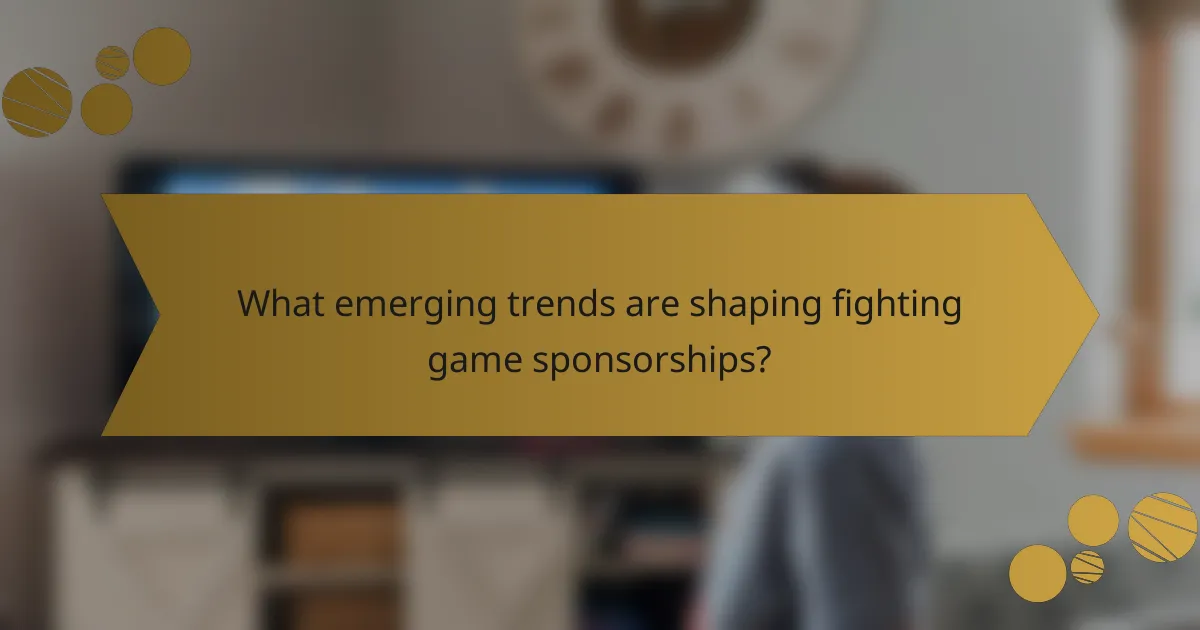
What emerging trends are shaping fighting game sponsorships?
Emerging trends in fighting game sponsorships include increased investment from major brands, a focus on community engagement, and the integration of digital platforms for broader reach. These trends are reshaping how tournaments are funded and how sponsors connect with audiences.
Increased Brand Investment
Major brands are increasingly investing in fighting game tournaments, recognizing the genre’s growing popularity and dedicated fanbase. Sponsorship deals often involve financial support, product placements, and promotional events, which can significantly enhance the tournament’s profile.
Brands typically seek to align with events that attract large audiences, both in-person and online. This can lead to multi-million dollar sponsorship agreements, especially for high-profile tournaments like EVO or Capcom Cup.
Community Engagement Strategies
Community engagement is becoming a pivotal aspect of sponsorships in fighting games. Sponsors are focusing on building relationships with players and fans through social media, interactive content, and grassroots events. This approach fosters loyalty and enhances brand visibility.
For example, sponsors may host community tournaments or provide platforms for player feedback, creating a more inclusive environment. Engaging with the community can lead to increased brand affinity and a stronger connection with the audience.
Digital Integration and Streaming
The integration of digital platforms and streaming services is transforming how fighting game sponsorships operate. Sponsors are leveraging platforms like Twitch and YouTube to reach wider audiences, offering live streams, exclusive content, and interactive experiences.
This digital focus allows sponsors to track engagement metrics and adjust their strategies accordingly. Brands can utilize targeted advertising and sponsorship placements during streams to maximize their visibility and impact.
